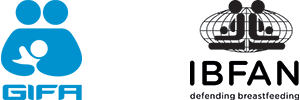24/01/2024
WBTi – World Breastfeeding Trends Initiative
The World Breastfeeding Trends Initiative (WBTi) is an international audit of breastfeeding policies and programmes. It was developed by IBFAN Asia to assess the status and to measure the progress of the implementation of the Global Strategy for Infant and Young Child Feeding (IYCF) in countries around the world.
WBTi – a tool and a data base
The WBTi tool is based on two global initiatives:
1. Global Participatory Action Research (GLOPAR), a project conceived by the World Alliance for Breastfeeding Action (WABA) in 1993 as part of a long term effort to mobilize groups and individuals around the world to protect, promote and support breastfeeding.
2. WHO’s Global Strategy on Infant and Young Child Feeding (IYCF 2003) – an instrument to assess practices, policies and programmes at the national level and to allow for international comparison.
The WBTi was created in 2005 to help countries assess the strengths and weaknesses of their policies and programmes to protect, promote and support optimal infant and young child feeding practices.
WBTi – and international assessment about breastfeeding
IBFAN Asia has developed the WBTi audit as a specific tool to identify, evaluate and monitor the implementation of the global strategy. It aims to strengthen and promote action on infant and young child feeding at the global level. The WBTi identifies gaps to help governments, bilateral partners and UN agencies commit resources where needed. It helps NGOs define areas for advocacy and action. It helps to develop and target effective strategies and investments to improve infant and young child feeding.
WBTi is being implemented as an integral part of the Global Breastfeeding Initiative for Child Survival (gBICS) in collaboration with Norway’s programme, The Global Campaign for the Millennium Development Goals.
WBTi – an initiative
- participatory : It aims to involve all stakeholders while avoiding conflicts of interest, working on infant and young child feeding, taking into account governments and NGOs. It is primarily participatory as participants collect information, analyse the results, identify gaps and take action based on the results. In the process, participants develop networking skills, investigative techniques and monitoring and reporting methods.
- action oriented : It aims to stimulate action not simply to seek information. Having more information is only necessary if there are strategies in place to translate that information into tools for change and to take action to improve the situation.
- based on basic research : it aims to encourage research, investigation, asking questions and finding out why breastfeeding is possible or impossible. The investigation is conducted by local people, not by foreign researchers. It leads to a comprehensive analysis to encourage action for change.
WBTi – a challenge for Europe too
Many European countries have been engaged in WBTi since 2015. As stated in the Lancet, Breastfeeding Series 2016 and Lancet, Breastfeeding Series 2023 articles, breastfeeding is also of great interest for the health of children and women in rich countries.
WBTi – Green Feeding for Europe
Breastfeeding plays an important role in protecting resources. IBFAN-GIFA has published an Advocacy Paper to raise awareness among candidates for the European Parliament elections: Document 2019 Green Feeding Europe-IBFAN-GIFA and webpage Green Feeding
Useful links
- WBTi Guide Book (English – French)
- Official WBTi portal: www.worldbreastfeedingtrends.org
- WBTi France (Report published in Decembre 2017)
- WBTi Swiss (Report published in February 2020)

